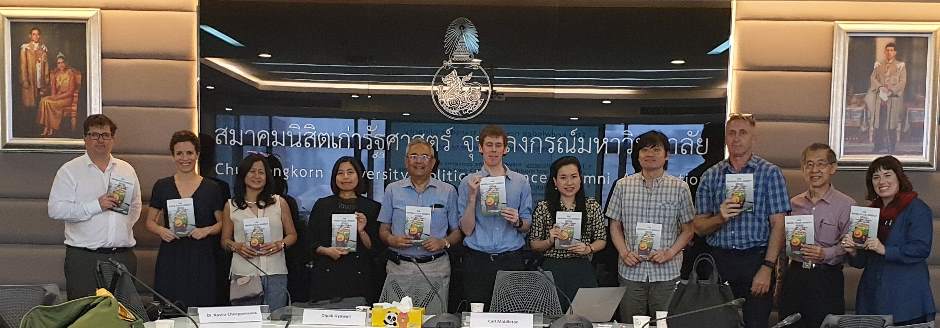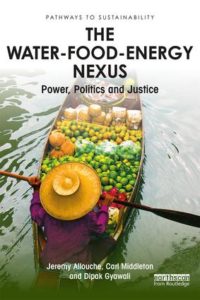by Jeremy Allouche, Carl Middleton and Dipak Gyawali
Earthscan/Routledge, April 2019
Download a chapter
Download the Accepted Manuscript (AM) of a chapter of the book. This document is Open Access and can be downloaded for free.
Chapter 4: The Knowledge Nexus and Transdisciplinarity
Events

The book was launched with an event at Chulalongkorn University in Thailand in May 2019 (pictured above).
About the book

The world of development thinkers and practitioners is abuzz with a new lexicon: the idea of “the nexus” between water, food and energy which is institutively compelling. It promises better integration of multiple sectoral elements, a better transition to greener economies and sustainable development. However, there appears to be little agreement on its precise meaning, whether it only complements existing environmental governance approaches or how it can be enhanced in national contexts. One current approach to the nexus treats it as a risk and security matter while another treats it within economic rationality addressing externalities across sector. A third perspective acknowledges it as a fundamentally political process requiring negotiation amongst different actors with distinct perceptions, interests and practices. This perspective highlights the fact that technical solutions for improving coherence within the nexus may have unintended and negative impacts in other policy areas, such as poverty alleviation and education.
The Water-Food-Energy Nexus: Power, Politics and Justice lays out the managerial-technical definitions of the nexus and challenges these conceptions by bringing to the forefront the politics of the nexus, around two key dimensions – a dynamic understanding of water-food-energy systems, and a normative positioning around nexus debates, in particular around social justice. The authors argue that a shift in nexus governance is required towards approaches where limits to control are acknowledged, and more reflexive/plural strategies adopted.
This book will be of interest to academic researchers, policy makers and practitioners in the fields of international development studies, environmental politics, science and technology studies as well as international relations.
This book is published in the Pathways to Sustainability book series.
Video: What is the nexus?
Co-author Jeremy Allouche (STEPS Centre/IDS) explains some of the criticisms of the nexus, and the importance of working with local people to think through the relationships between water, food and energy.
Reviews
Beyond the commonplace recognition that the ‘nexus’ conceptual basis is not new and that integrative imperatives already featured in IWRM, this book further examines the underbelly of the beast and convincingly exposes the political underpinnings of a concept presented as a-political and ‘manageable’ through integrative tools, expert modeling, bureaucratic reforms and rational efficiency-driven thinking. It reveals the underlying business imperatives and green economy logics, traces the global diffusion of the concept, and emphasizes that issues of distributional justice, knowledge production and democratization of governance need to take center stage if the concept is to be transformative rather than supporting the status quo. An excellent reading for all water students and scholars interested in deciphering the word of water concepts and the interests and values that undergird them.
François Molle
Institut de Recherche pour le développement (IRD), France
See also this longer review in the journal Water Alternatives
We frequently hear of the nexus—but what does this mean, what does it entail, and where to begin? To such questions, Allouche offers a critical guide. Careful to consider complexities and uncertainties, the theoretical discussion coupled with multi-sited case studies, offers a compelling treatment. Readers wanting to know more of the concept, including political economic and equity implications, will find reading the book to be time well spent.
Leila M Harris
University of British Columbia / Institute for Resources, Environment and Sustainability / Institute for Gender, Race, Sexuality and Social Justice, and Program on Water Governance
Other reviews
Review by Michael Jacobson, Penn State (WEF in Africa website)
Finding the nexus between water, food and energy by Kunda Dixit, Nepali Times